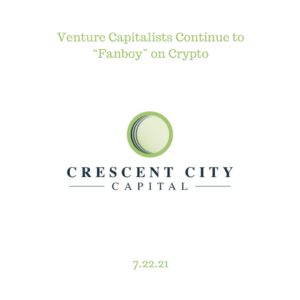Venture Capitalists Continue to “Fanboy” on Crypto
Written By: Kenichi Yamaguchi | July 15 2021
According to data from CB Insights, a business trend observation agency, in the second quarter, cryptocurrency companies raised a record US$4 billion in venture capital, of which overall financial technology transactions received US$30.8 billion, a year-on-year increase of 29%. The report cited a large number of financing rounds, such as the stablecoin company Circle, which raised a record $440 million in May. (Earlier this week, a cryptocurrency company received its largest new round of financing when the cryptocurrency derivatives exchange FTX announced that it had raised US$900 million.) CB Insights also noted that hardware wallet manufacturer Ledger’s 380 million in June U.S. dollar financing; April raised $300 million for the custody company Paxos (like Circle, it also acts as a stablecoin steward); Block.one’s $300 million financing in May for bullish exchanges; and May from Mexico City Bitso’s $250 million loot. Although the prices of Bitcoin and other cryptocurrencies have stabilized in recent weeks, so far in the third quarter, the size of the cryptocurrency rebound seems to be increasing, with FTX leading the way.
As the name suggests, the venture capital firm Pillar VC is focused on establishing “pillar” companies in Boston and throughout the Northeast. This seed-stage company in Boston completed a financing of US $ 192 million, which was divided into two funds, US $ 169 million for Pillar III and US $ 23 million for Pillar Select. More than 25 investors support the new fund, including the portfolio founders. Jamie Goldstein, Sarah Hodges and Russ Wilcox are Pillar VC’s three partners and are also Pillar’s top three investments. All three have business backgrounds: Goldstein worked at VC for 20 years and co-founded the speech recognition company PureSpeech, which was acquired by Voice Control Systems; Hodges worked at the online learning company Pluralsight; Wilcox was CEO of a paper company electronics company. E Ink, which sold the company in 2009. Pillar typically invests in a number of consumer and startup companies, with the goal of targeting Pillar III at startups that focus on biology, enterprise SaaS, AI / ML, encryption, fintech, hardware, manufacturing, and logistics. The company will make a pre-seed investment of between US $ 50,000 and US $ 500,000 and an initial round investment of US $ 2 million to 6 million. One of the unique characteristics of the company is that it will buy common stock to align with the founder and take the same risks, Goldstein told TechCrunch. The company was founded in 2016 and its first two funds already have 50 portfolio companies: Pillar I has raised $ 57 million and Pillar $ 100 million. These include Circle, the cryptocurrency company that announced the establishment of SPAC earlier this month, Desktop Metal, a 3D printing company that also went public through SPAC last year, and PillPack, which was acquired by Amazon in 2018.
“Pillar is an experiment that answers the question of ‘what happens if a unicorn CEO comes in and helps guide the next generation,” Wilcox said. “The experience is effective. Pillar has done what venture capitalists should do. This is the first idea.” In addition to leading investments, Hodges also leads the company’s portfolio company Pillar VC platform. Many portfolio companies come from universities and need help transforming this technology into a business. Pillar provides guidance on the business side of hiring CEOs or partners, leadership development, recruiting talent, and introducing potential clients. Wilcox said Pillar also intends to invest a third of the new fund in this biological category, with a particular focus on integrating life sciences and technology. In its second fund, the company established Petri, a pre-configured bio-accelerator focused on biotechnology, and recruited computing and engineering to develop agriculture, genetics, cell and gene therapy, medical data, and drugs. Founder of technology in the field of discovery. The third fund will continue to support accelerators through pre-allocation and seed investment. Pillar III investment is being finalized, but Hodges expects to inject capital into another 50 companies. “We are very optimistic about Boston,” he added. “Many companies here are growing into household names, and exciting energy is emerging.”
In a similar sector, Magic is a way to log into the website without relying on passwords or a centralized honeypot that stores a large number of passwords, and has completed a funding of 27 million dollars. The Series A financing announced Thursday was led by Northzone, including Tiger Global, Volt Capital, CoinFund, and Digital Currency Group (also owner of CoinDesk). After an initial round of $ 4 million in May 2020, he brought Magic’s total funding to $ 31 million, including companies like Placeholder, SV Angel, and Naval Ravikant. Password is typically a way for users to prove ownership of the long alphanumeric private key. These secret passwords are trusted by platforms like Equifax, LinkedIn, or Kickstarter. Once an attacker penetrates one of the platforms and accesses the hashed password database, they can attempt to brute-force weaker passwords. These passwords can also be used in other places, such as a user bank account.
All fingers point to VCs with undeniable interests and continuous support for the future of cryptocurrency. This is a giant leap forward in adoption of crypto in the real world, and now it is up to the companies and government to work together and figure out a solution to the coexistence of capitalism and crypto.

